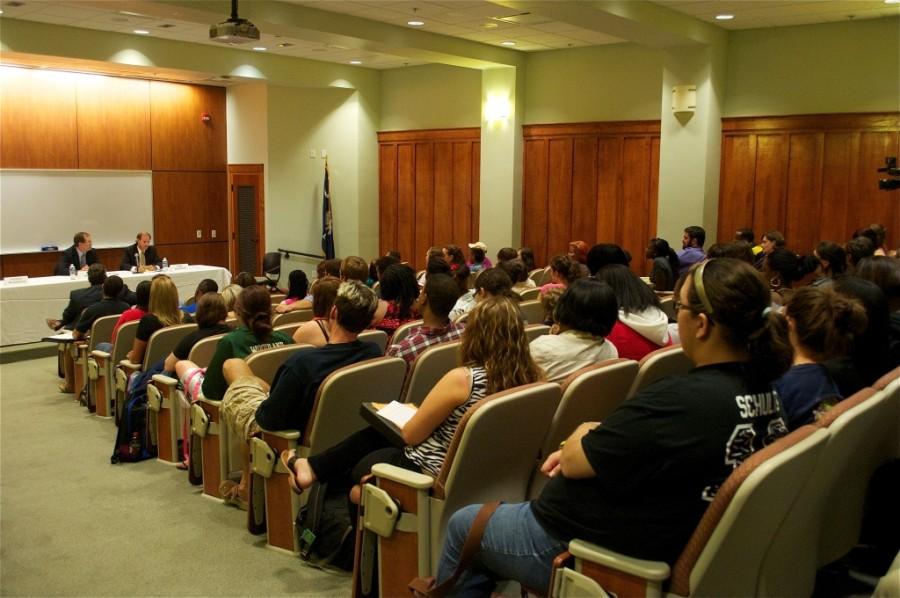Pee Dee attorneys informed students about the effects of online media on their constitutional rights in honor of National Constitution Day during a political presentation on Wednesday, Sept. 24th in the Thomason Auditorium.
Constitution Day celebrates the signing of the nation’s most supreme body of law, the United States Constitution, on Sept. 17, 1789. Since 2005 all educational institutions have observed this day.
Each year the Department of Political Science and Geography has organized and sponsored the program with financial assistance provided by the university’s provost office. The cost of production is about $500 annually. However, payment is not usually requested by the chosen panel of local political scientists, historians, or attorneys typically that teach students about their specific privileges and duties as citizens under a particular amendment.
This year those in attendance learned about the laws established by the Fourth Amendment, which ensures the privacy of the people by protecting them from unreasonable searches and seizures by the government.
Guest speaking attorneys Hank Anderson, Patrick McLaughlin, and Michael Meetze chose to highlight the conflict between the Fourth Amendment and the amount of personal information given out over the Internet.
The topic was selected because teenagers and young adults, like as those who comprise the university’s population, are the largest consumers of online media.
The lecture was given in two parts. Students viewed a PowerPoint presentation about the various laws which had been developed in response to the growth of online media. Afterwards, the attorneys sat in panel and answered individual questions posed by students and faculty.
McLaughlin, who serves as president of the South Carolina Association of Criminal Defense Lawyers, explained that texts or images posted on the web can be accessed by anyone and are therefore no longer considered private property.
“If anyone can see it, then there is no privacy,” McLaughlin said.
The willingness of Internet users to supply information online has led to the creation and development of policies that challenge the Fourth Amendment, such as the Public-Vantage and Third Party doctrines.
The Public-Vantage Doctrine states that an individual’s right to privacy is given up once information is accessible by the public.
The widespread use of social networking sites, such as Facebook and Twitter, has contributed to the compromise of personal information in exchange for the opportunity to share experiences with a large public.
Because texts and images posted on social sites are in plain view of the public, government and police officials are allowed to search web pages if an issue of suspicious or criminal activity should arise.
However, Anderson, a Marion County public defender, expressed disagreement with the government’s ability to obtain and restrict the sharing of information through social networking.
“The government shouldn’t be able to choose how far sharing goes,” Anderson said.
Although police searches of personally owned web pages can be done without the owner’s knowledge, they cannot, however, be done without their permission.
When web users sign the Licensed Terms of Agreement contract to receive services from an Internet Service Provider (ISP), under the Third Party Doctrine, they also give the company or organization permission to release information to government authorities upon request.
The Third Party Doctrine states that by revealing information to a third party, or ISP, Internet users sacrifice the Fourth Amendment protection of that information.
McLaughlin explained that the government may encounter complications as it attempts to create more advanced policies to contend with the growth of technology.
“The law doesn’t move as fast as technology,” McLaughlin said.
Even though there are laws in place to permit searches, most Internet users are not investigated. The government’s primary focus is to protect citizens from inappropriate or criminal activity that may be found online, like cyber bullying, identity theft, and sexual predation.
Meetze, an Assistant Federal Public Defender of the South Carolina District, expressed that he hoped the program had informed students of their rights and made them more aware of how the government works.
“In order to protect themselves, it’s important that students have a better knowledge of their rights and take them seriously,” Meetze said.
